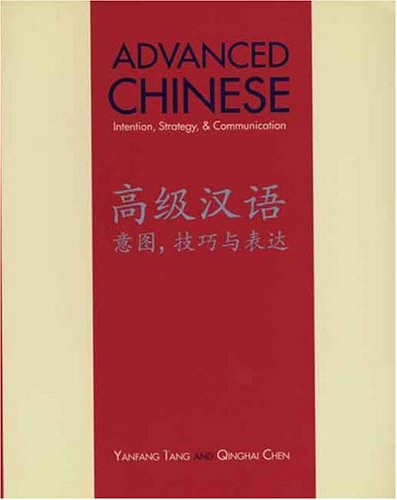
6 Tools You’ve Gotta Use to Learn Advanced Chinese
Have you studied Chinese for a while and are now ready to take the next step?
Getting from intermediate to advanced Chinese is one of the hardest steps in learning the language. But why is that?
It might be the same in every language. You’re pretty good at talking about common topics and getting around in places the language is spoken… but what about more advanced content?
Maybe Chinese news broadcasts, newspapers and stories still pose quite a challenge.
Well, you’re in the right place! Read on for six learning tools to help you make the leap to advance Chinese.
Contents
- The Leap Between Intermediate and Advanced Chinese
- Create a Study Plan to Overcome the Difficulties
- Resources for Learning Advanced Chinese
- And One More Thing...
Download: This blog post is available as a convenient and portable PDF that you can take anywhere. Click here to get a copy. (Download)
The Leap Between Intermediate and Advanced Chinese
The step from intermediate to advanced is a hard one, and probably the most distinct during your entire language journey. You might have to completely readjust your study routine and switch to other materials in order to make it to the next level.
Getting stuck in the intermediate level is common, but with the tools and tips presented below, you can reach an advanced level of Chinese.
A lot of dedication and hard work is involved if you want to make it there. You need to consecutively improve each part of the Chinese language: reading, writing, listening and speaking.
At this stage, you also most likely have to decide to speak in the Chinese accent that you favor most.
Do you fancy the standard Putonghua dialect from around Beijing? Or do you pronounce words in a Southern accent since you spent most of your time studying in Guangzhou? It’s up to you, as long as it is correct and the people around you can understand you.
The resources and study materials to get you to the next level might differ from what you used before, too. Advanced Chinese material tends to be more abstract and creative than textbooks or CDs that beginners and intermediate learners use.
Create a Study Plan to Overcome the Difficulties
One of the hardest parts of getting to that advanced Chinese level is the dedication and proper time management to keep on track. We all have busy lives full of work, family, friends and hobbies. It is therefore important not to lose track of what you want to achieve. That’s where proper time management in the form of a study plan comes in.
Creating a study plan helps you stay focused on your goals. Determine a certain period of time you want to give yourself to efficiently study advanced Chinese. Keep it realistic! For example, try a timeframe of six months.
Next, determine what tools you want to use (mentioned below). How many books do you think you can finish in half a year? How many chapters of a textbook can you work through? Or how many podcasts do you want to listen to?
Keep your tools and goals realistic but challenging, and adjust them to your daily life. It’s so much better to study a little every day than to study for a long period of time once a week.
Write everything down on a neat study plan for the next week or month, with specific tasks and an amount of time for each day. I only suggest planning a week or month out so that you can adjust based on what’s working well, where you need extra work, etc.
Lastly, hang up your plan in a very visible place, and don’t forget to check off steps after you complete them.
Resources for Learning Advanced Chinese
As mentioned above, there is quite a difference between tools for beginners and intermediate Chinese learners compared to advanced learners. Incorporate the following tools into your study plan, and you’ll be well on your way up the hill towards advanced Chinese.
1. Chinese Reading Materials
Reading is the vitamin A of learning Chinese and getting to that advanced level. The more you read, the more vocabulary and grammar patterns you absorb, and the more you’re able to actively use them.
Even though textbooks seem a little useless at this point, there are special books made specifically for advanced learners that focus on advanced grammar content.
Yale University published a great textbook called “Advanced Chinese: Intention, Strategy, and Communication.” This book includes an audio program focusing on the variety of Chinese linguistic strategies that are essential for advanced communication.
There are five types of discourse that are considered in detail: narration, description, persuasion, exposition and lyrical expression. The book assists learners in improving all parts of the Chinese language through carefully selected vocabulary, grammar and exercise sections in each lesson.
 Besides textbooks, reading novels is key. If you haven’t read a book in Chinese before, you might want to start with a guided book. “The Graded Chinese Reader 2000 Words” containing selected contemporary short stories can help you with your first Chinese novel experience.
Besides textbooks, reading novels is key. If you haven’t read a book in Chinese before, you might want to start with a guided book. “The Graded Chinese Reader 2000 Words” containing selected contemporary short stories can help you with your first Chinese novel experience.
The book features various versions of mini-stories and novellas written by contemporary Chinese writers, reflecting the everyday lives of ordinary Chinese people. The stories are limited to about 2,000 common Chinese words, which are based on the 2,500 Chinese words listed in the Chinese Proficiency Test Syllabus Level 5.
The key to efficiently using a book of advanced Chinese level is to remember the new vocabulary. Highlight new words and look up their meanings afterwards. There’s no need to write down every single word. Choose up to 10 words of new vocabulary per chapter and practice them afterwards.
Possible Study Plan Items:
- Read two pages of “Graded Chinese Reader” and try to summarize the content in your own words afterwards.
- Read one of these Chinese novels for 5 minutes, and underline 10 unknown words. Afterwards, look them up in a dictionary and write them down in a notebook (or make flashcards, or use whatever system works best for you).
- Read the Chinese classic “The Art of War” by Sun Tzu in Chinese to broaden your vocabulary and deepen your cultural insights.
2. Authentic Chinese Materials
The real difference between intermediate and advanced Chinese is the vocabulary you can actively use.
You might study words from books or newspapers, but that’s usually not how people really talk. So try and learn “modern” vocabulary as well as idioms. If you master this type of real-world content, your Chinese level will soar.
I learned a lot of this kind of vocabulary by watching modern Chinese TV shows, such as “爸爸去哪儿” (bà ba qù nǎ er) — Where Are You Going, Daddy, and “非诚勿扰” (fēi chéng wù rǎo) — You Are the One.
There are even books that focus on colloquial Chinese, like “Illustrated Chinese Buzzwords” and “Illustrated Chinese Idioms.”
Possible Study Plan Items:
- Watch an episode of “爸爸去哪儿.”
- Use a new idiom or slang term seven times today—some spoken and others in writing.
3. Chinese Media
A little bit more challenging but fun are Chinese shows, such as “The Empress of China.” It features top actress 范冰冰 (Fan Bingbing) and tells the story of the first and only legitimate Empress of China during the Tang Dynasty.
Similarly, have you ever listened to Chinese radio stations? There are multiple Mandarin stations you can play online from all over the world. You can find new music, news and chats about a variety of topics.
Only have a few minutes? Feel the pull of a YouTube binge? A program like FluentU can satisfy either situation while keeping you focused.
FluentU takes authentic videos—like music videos, movie trailers, news and inspiring talks—and turns them into personalized language learning lessons.
You can try FluentU for free for 2 weeks. Check out the website or download the iOS app or Android app.
P.S. Click here to take advantage of our current sale! (Expires at the end of this month.)
Possible Study Plan Items:
- Watch an episode of “The Empress of China” every week.
- For a challenge, dissect the lyrics to a rap song and look up all unknown words.
- Spend five minutes every day for a month using FluentU to master the lyrics of a Chinese music video.
4. Time in China
One of the easiest ways to improve a language is to spend time in the country where the language is spoken.
Travel to China or, better, move and live there for a while. Internships in China, volunteer programs or simply vacation time in a Mandarin-speaking region can help you broaden your horizons and advance your language level.
Possible Study Plan Items:
- Spend 20 minutes researching an internship or volunteer program in China.
- Contact a blogger who has lived, worked or volunteered in China and ask them questions, or set up a time to video chat.
- Set up a budget and specific savings plan for your airfare. If you’re serious about making this happen and have never tracked your money before, we recommend using You Need a Budget.
5. Chinese Language Partner
All the traveling in the world is no good if you don’t open your mouth and speak the language. If you aren’t able to visit China at this point, or if you want to practice beforehand, you absolutely should be practicing with a language partner to reach the advanced level.
The online platform italki is a great way to meet people who want to learn your mother tongue and help you practice your target language.
Is there a Chinese community in your city that already has a conversation table? Look for them on Facebook, Meetup or notice boards at universities and public libraries.
Or, why not start a Chinese conversation group of your own? Invite locals and Chinese people to join, and advertise your group with flyers and social media. Be sure to visit local universities, Chinese restaurants and supermarkets to connect with the community.
Possible Study Plan Items:
- If you don’t have a Chinese language partner yet, your first action item is to use all of these resources and find one.
- Meet with your language partner or attend a Chinese conversation table once a week this month.
- Discuss a current news story with your language partner.
6. Advanced Chinese Courses
Fluency is the typical goal for advanced Chinese learners, and lessons can aid in that goal. Don’t nix traditional courses just because you’ve leveled up! You simply need to find the right ones to challenge your skills properly.

If you want a certificate, expect to pay around $49 (financial aid is available). If you’re not interested in a certificate, you can access all of the course materials for free.
 There’s also an intensive course (HSK6) from Udemy designed to help you communicate personally and professionally in Mandarin and express yourself orally and on paper at a near-native level.
There’s also an intensive course (HSK6) from Udemy designed to help you communicate personally and professionally in Mandarin and express yourself orally and on paper at a near-native level.
You’ll need to have proof of passing HSK5 and knowledge of approximately 1,200 vocabulary words. Some materials are free, but you may be able to get the rest for as low as about $10.

The tutoring sessions are done through Skype so you can interact with a Mandarin teacher directly. Sessions start at just $22.
 Still not sold? Then consider the Advanced Chinese Podcast from Seton Hall University. This free resource is perfect for those still struggling with listening, speaking and comprehending oral Mandarin.
Still not sold? Then consider the Advanced Chinese Podcast from Seton Hall University. This free resource is perfect for those still struggling with listening, speaking and comprehending oral Mandarin.
The 29-part course can be listened to whenever you have spare moments. Though the course may vary in audio quality, the lesson quality is sure to put you on the right track to continuing your Mandarin studies.
Possible Study Plan Items:
- Look into the course or courses that you think fit your needs the best and sign up for at least one.
- Advanced Chinese courses can introduce you to rare and difficult terms, phrases and more. Make sure to study them after each lesson ends.
The path of advanced Chinese is not an easy one. But with the tools mentioned above, the journey will be much easier for you.
Never forget to stay motivated—progress takes time!
Download: This blog post is available as a convenient and portable PDF that you can take anywhere. Click here to get a copy. (Download)
And One More Thing...
If you want to continue learning Chinese with interactive and authentic Chinese content, then you'll love FluentU.
FluentU naturally eases you into learning Chinese language. Native Chinese content comes within reach, and you'll learn Chinese as it's spoken in real life.
FluentU has a wide range of contemporary videos—like dramas, TV shows, commercials and music videos.
FluentU brings these native Chinese videos within reach via interactive captions. You can tap on any word to instantly look it up. All words have carefully written definitions and examples that will help you understand how a word is used. Tap to add words you'd like to review to a vocab list.
FluentU's Learn Mode turns every video into a language learning lesson. You can always swipe left or right to see more examples for the word you're learning.
The best part is that FluentU always keeps track of your vocabulary. It customizes quizzes to focus on areas that need attention and reminds you when it’s time to review what you’ve learned. You have a 100% personalized experience.
Start using the FluentU website on your computer or tablet or, better yet, download the FluentU app from the iTunes or Google Play store. Click here to take advantage of our current sale! (Expires at the end of this month.)








